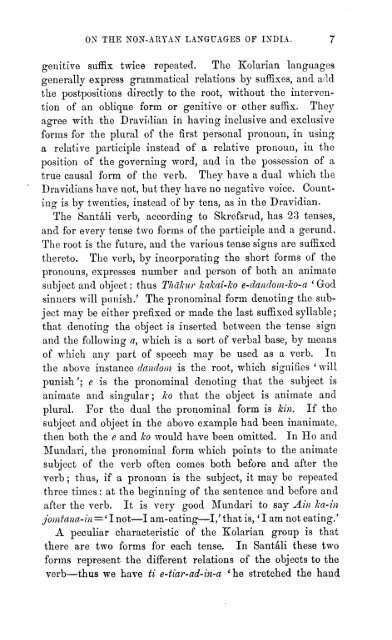Create successful ePaper yourself
Turn your PDF publications into a flip-book with our unique Google optimized e-Paper software.
ON THE NON-ARYAN LANGUAGES OF INDIA. 7<br />
genitive suffix twice repeated. The Kolarian <strong>languages</strong><br />
generally express grammatical relations by suffixes, and add<br />
<strong>the</strong> postpositions directly to <strong>the</strong> root, without <strong>the</strong> intervention<br />
<strong>of</strong> an oblique form or genitive or o<strong>the</strong>r suffix. They<br />
agree with <strong>the</strong> Dravidian in having inclusive and exclusive<br />
forms for <strong>the</strong> plural <strong>of</strong> <strong>the</strong> first personal pronoun, in using<br />
a relative participle instead <strong>of</strong> a relative pronoun, in <strong>the</strong><br />
position <strong>of</strong> <strong>the</strong> governing word, and in <strong>the</strong> possession <strong>of</strong> a<br />
true causal form <strong>of</strong> <strong>the</strong> verb. They have a dual which <strong>the</strong><br />
Dravidians have not, but <strong>the</strong>y have no negative voice. Count-<br />
ing is by twenties, instead <strong>of</strong> by tens, as in <strong>the</strong> Dravidian.<br />
The Santali verb, according to Skrefsrud, has 23 tenses,<br />
and for every tense two forms <strong>of</strong> <strong>the</strong> participle and a gerund.<br />
The root is <strong>the</strong> future, and <strong>the</strong> various tense signs are suffixed<br />
<strong>the</strong>reto. The verb, by incorporating <strong>the</strong> short forms <strong>of</strong> <strong>the</strong><br />
pronouns, expresses number and person <strong>of</strong> both an animate<br />
subject and object : thus Thdhur kakai-ko e-dandom-ko-a ' God<br />
sinners will punish.' The pronominal form denoting <strong>the</strong> sub-<br />
ject may be ei<strong>the</strong>r prefixed or made <strong>the</strong> last suffixed syllable;<br />
that denoting <strong>the</strong> object is inserted between <strong>the</strong> tense sign<br />
and <strong>the</strong> following a, which is a sort <strong>of</strong> verbal base, by means<br />
<strong>of</strong> which any part <strong>of</strong> speech may be used as a verb. In<br />
<strong>the</strong> above instance dandom is <strong>the</strong> root, which signifies ' will<br />
punish '; e is <strong>the</strong> pronominal denoting that <strong>the</strong> subject is<br />
animate and singular; ko that <strong>the</strong> object is animate and<br />
plural. For <strong>the</strong> dual <strong>the</strong> pronominal form is kin. If <strong>the</strong><br />
subject and object in <strong>the</strong> above example had been inanimate,<br />
<strong>the</strong>n both <strong>the</strong> e and ko would have been omitted. In Ho and<br />
Mundari, <strong>the</strong> pronominal form which points to <strong>the</strong> animate<br />
subject <strong>of</strong> <strong>the</strong> verb <strong>of</strong>ten comes both before and after <strong>the</strong><br />
verb ; thus, if a pronoun is <strong>the</strong> subject, it may be repeated<br />
three times : at <strong>the</strong> beginning <strong>of</strong> <strong>the</strong> sentence and before and<br />
after <strong>the</strong> verb. It is very good Mundari to say Ain ka-in<br />
jO}ntana-m='Inot—I am-eating—I,'that is, *I am not eating.'<br />
A peculiar characteristic <strong>of</strong> <strong>the</strong> Kolarian group is that<br />
<strong>the</strong>re are two forms for each tense. In Santali <strong>the</strong>se two<br />
forms represent <strong>the</strong> different relations <strong>of</strong> <strong>the</strong> objects to <strong>the</strong><br />
verb—thus we have ti e~tiar-ad-in-a 'he stretched <strong>the</strong> hand

















